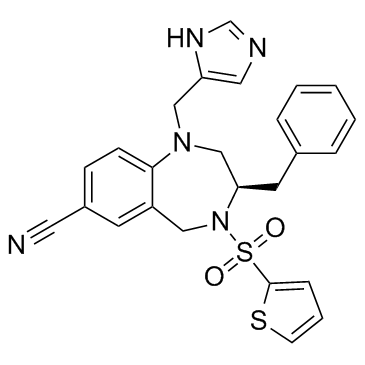195987-41-8
| Name | (3R)-3-benzyl-1-(1H-imidazol-5-ylmethyl)-4-thiophen-2-ylsulfonyl-3,5-dihydro-2H-1,4-benzodiazepine-7-carbonitrile |
|---|---|
| Synonyms |
3-BENZYL-1-(1H-IMIDAZOL-4-YLMETHYL)-4-(THIEN-2-YLSULFONYL)-2,3,4,5-TETRAHYDRO-1H-1,4-BENZODIAZEPINE-7-CARBONITRILE
BMV (R)-1-((1H-imidazol-5-yl)methyl)-3-benzyl-4-(thiophen-2-ylsulfonyl)-2,3,4,5-tetrahydro-1H-benzo[e][1,4]diazepine-7-carbonitrile BMS-214662 |
| Description | BMS-214662 is a potent and selective farnesyl transferase inhibitor with potent antitumor activity with an IC50 of 1.35 nM. |
|---|---|
| Related Catalog | |
| Target |
IC50: 1.35 nM (farnesyl transferase), 1.3 μM (Ras-CVLL), 2.3 μM (K-Ras)[1] |
| In Vitro | BMS-214662 is over 1000-fold selective for farnesyl transferase, having IC50 values for inhibition of geranylgeranylation of Ras-CVLL and K-Ras of 1.3 and 2.3 μM, respectively[1]. BMS-214662 shows good potency in inhibiting H-ras-transformed rodent cells, A2780 human ovarian carcinoma tumor cells, and HCT-116 human colon carcinoma tumor cells. BMS-214662 is the most potent apoptotic FTI known and demonstrates broad spectrum yet robust cell-selective cytotoxic activity against a panel of cell lines with diverse histology[2]. |
| In Vivo | Tumors from BMS-214662-treated mice have increased numbers of apoptotic cells as compared with the nontreated control mice. The AIs in HCT-116 tumors are increased 4-10-fold in BMS-214662-treated mice as compared with nontreated controls. BMS-214662 is significantly cytotoxic to both HCT-116 and EJ-1 tumor cells; the doses of BMS-214662 required to kill 90% of clonogenic tumor cells are approximately 75 and 100 mg/kg for HCT-116 and EJ-1 tumors[2]. |
| Cell Assay | The hydrochloride salt of BMS-214662 is dissolved in DMSO with dilutions made using either water or RPMI 1640 plus 10% fetal bovine serum. BMS-214662 is added at various concentrations. The cells are incubated at 37°C for 72 h, at which time MTS in combination with phenazine methosulfate is added. After an additional 3 h, the absorbance is measured at 492 nm, and the growth inhibition results are eventually expressed as IC50s[2]. |
| Animal Admin | Mice: BMS-214662 is dissolved in ethanol, followed by dilution with water to a final ethanol concentration of 10%. Mice implanted with HCT-116 xenografts are administered a single dose of BMS-214662 at 250 mg/kg i.v., 300 mg/kg i.p., or 400 mg/kg p.o. An additional group receives 400 mg/kg BMS-214662 daily for 2 days (administered p.o. on day 1 and i.p. on day 2). Nontreated mice with time-matched HCT-116 tumors served as controls. Tumors are collected at 24 h after dose, processed following standard methods, sectioned, and stained with H&E. Serial sections of each tumor are processed for in situ apoptotic cell labeling by the TUNEL method[2]. |
| References |
| Density | 1.45g/cm3 |
|---|---|
| Boiling Point | 790.9ºC at 760mmHg |
| Molecular Formula | C25H23N5O2S2 |
| Molecular Weight | 489.61200 |
| Flash Point | 432.1ºC |
| Exact Mass | 489.12900 |
| PSA | 129.71000 |
| LogP | 5.24898 |
| Vapour Pressure | 5.38E-25mmHg at 25°C |
| Index of Refraction | 1.722 |
| Storage condition | 2-8℃ |
